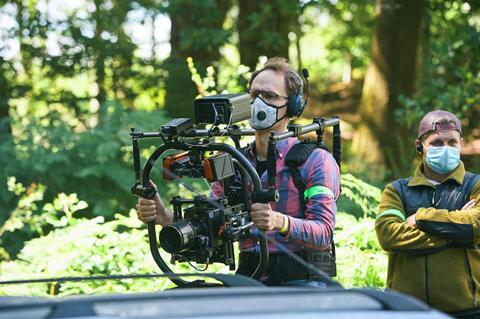
Covid-19 safety guidelines for film and TV production shoots in the UK will remain in place from Monday July 19, despite changes to the law in England from that date, Screen understands.
Social distancing and the wearing of face masks will no longer be mandated under English law from July 19, including in indoor spaces and on public transport. However, this will not precipitate a change in the British Film Commission’s production guidance, titled ‘Working Safely During COVID-19 in Film and High-end TV Drama Production’.
“Our production guidance will remain: it was created in response to industry need, in partnership with industry and building upon the latest government guidance,” said Adrian Wootton, chief executive of the BFC and Film London. “Its practices are now established and followed – and in some cases voluntarily exceeded – by studios and productions, who all seek to keep the safety of cast, crew and community at the top of the agenda.
”Any updates needed will be based on, and where necessary build upon, the most relevant new safer working guidance for our sector provided by the Government, as well as more general policy updates and technical considerations,” added Wootton.
The document, prepared in consultation with the Department for Digital, Culture, Media and Sport (DCMS) and in consultation with Public Health England and the Health and Safety Executive, has undergone regular revisions since its initial publication in June last year.
The guidance was last updated on July 2, 2021.
The first page of the 58-page document says it aims to ensure “as many people as possible comply with social distancing guidelines (2m apart, or 1m+ with risk mitigation where 2m is not viable).”
It also states that “it is important that you continue to put measures in place to reduce the risk of Covid-19 transmission, including maintaining social distancing, frequent cleaning, good hygiene and adequate ventilation.”
The guidance currently notes that “people are required to wear a face covering by law in some public places unless they have a reasonable excuse for not wearing one or are not able to wear one, for example, because of their age or a health condition, or they are a performer on-camera or in rehearsal.”
It goes on to say: “People are also strongly encouraged to wear a face covering in other enclosed public spaces where social distancing may be difficult and where they come into contact with people they do not normally meet.”
Further guidance is provided for ‘close contact’ roles such as costume fitters, hairdressers and make-up artists.
The guidance also notes that it is not legally binding, stating on the second page: “These materials are for general information purposes only, are not intended to constitute legal or other professional advice, and should not be relied on or treated as a substitute for specific advice relevant to particular circumstances.”
Covid-19 has posed a challenge for productions on both a health level and a financial one, with insurers wary of the risk of productions shutting down due to an outbreak.
The law change on Monday will only apply to England. Scotland is moving to ‘level zero’ of its Covid-19 roadmap with the removal of many restrictions from Monday; however, face coverings will still be required in public spaces, with first minister Nicola Sturgeon saying this week that she expects them to remain mandatory for “some time”.
Restrictions in Wales will ease from Saturday, July 17, but face masks will still be required in most indoor public places and on public transport.
For Northern Ireland, the legal requirement for social distancing will be reduced to one metre from July 26; however, face coverings will remain mandatory in most public indoor spaces.






![The Brightest SunScreen[Courtesy HKIFF]](https://d1nslcd7m2225b.cloudfront.net/Pictures/274x183/3/5/0/1448350_thebrightestsunscreencourtesyhkiff_312678.jpg)


















No comments yet